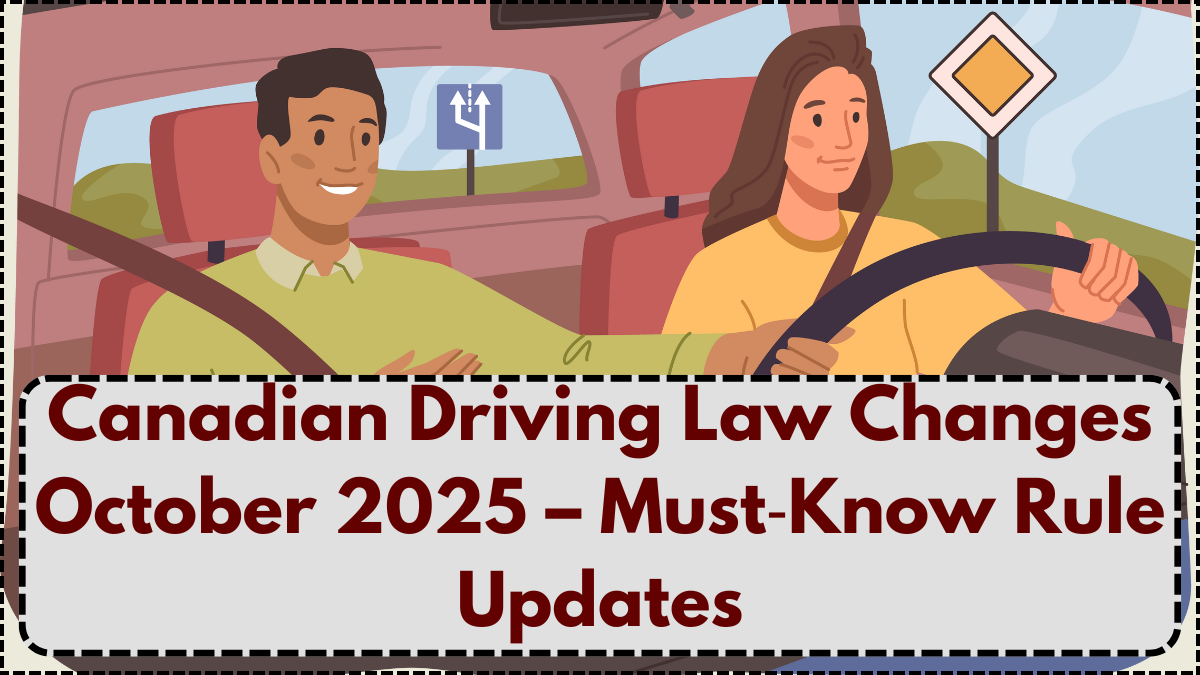Canada’s roads are set for a regulatory shake-up starting October 2025. These Canadian driving law changes October 2025 affect both new and seasoned drivers, introducing stricter enforcement measures, clearer road protocols, and revised traffic penalties across multiple provinces. The updated framework prioritizes safety, accountability, and consistency.
Whether you’re commuting daily, managing commercial routes, or planning a road trip, being aware of these new road rules is essential. Here’s what’s changing and how it could impact you.

Table of Contents
Updated Speed Limits and Zone Classifications
Effective October 1, 2025, municipalities across Ontario, British Columbia, and Quebec are authorized to reduce speed limits in residential areas to 30 km/h. This effort aims to lower pedestrian and cyclist injuries, especially in school zones. Highway limits remain mostly unchanged, but photo radar enforcement zones will be expanded into suburban and rural stretches.
In Alberta, construction zones will now retain reduced speed limits 24/7, not just when workers are present. Drivers caught exceeding these limits can face immediate license suspensions under the new framework.
Province |
Key Speed Changes |
New Enforcement Measures |
|---|---|---|
Ontario |
30 km/h in residential areas |
Expanded photo radar |
Alberta |
All-time reduced construction zone speed |
On-the-spot license suspensions |
Quebec |
Slower school zone limits |
Fines doubled during school hours |
Stricter DUI Thresholds and Testing Technology
Under the Canadian driving law changes October 2025, all provinces will now enforce a unified Blood Alcohol Concentration (BAC) threshold of 0.05%, down from 0.08% in several regions. This change aligns with global safety benchmarks and is expected to drastically reduce impaired driving incidents.
Roadside testing will also get a tech upgrade. Law enforcement agencies will begin using AI-enhanced breath analyzers and drug screening devices that provide faster and more accurate results. Refusing a test now carries a minimum $2,500 fine and a 90-day license suspension.
Overhauled Demerit Point System
The nationwide demerit point system is being revamped to make repeat offenders more accountable. Violations like distracted driving, failure to yield, and speeding in safety zones will now carry heavier point penalties. Accumulating more than 10 points within 12 months will trigger mandatory driving education courses.
The updates aim to rehabilitate rather than just punish drivers. First-time violators may be offered reduced penalties in exchange for completing a defensive driving program, which is now government-funded in some provinces.
Parking and Idle Law Revisions
Urban centers including Vancouver, Montreal, and Toronto are adopting stricter anti-idling laws. Vehicles left idling for more than 60 seconds in non-extreme weather conditions will incur fines ranging from $150 to $400.
Additionally, the fine structure for illegal parking near bike lanes, crosswalks, and fire hydrants has increased. Towing enforcement will also be more proactive, particularly during peak hours.
What These Changes Mean for You
The new road rules being implemented across Canada in October 2025 are not just about penalizing bad behavior—they’re about fostering a culture of responsible driving. These rules aim to reduce injuries, improve traffic flow, and make the roads safer for everyone.
If you drive regularly, it’s important to revisit your understanding of the laws. Even small infractions can now lead to significant consequences under the updated traffic penalties.
Conclusion
The Canadian driving law changes October 2025 introduce meaningful and impactful updates designed to protect public safety and promote responsible driving habits. With reduced speed limits, tighter DUI thresholds, and higher penalties for violations, these changes signal a national shift in traffic governance. Staying informed isn’t optional—it’s essential for anyone behind the wheel.
FAQ
What is the new legal BAC limit in Canada as of October 2025?
The new legal Blood Alcohol Concentration (BAC) limit is 0.05% nationwide.
Will these changes affect G1 and G2 license holders?
Yes, novice drivers will face even stricter penalties under the new demerit system.
Are the speed limit reductions permanent?
Municipalities have the option to keep these limits long-term based on safety assessments.
How can I avoid the new idling fines?
Always turn off your engine when parked for more than 60 seconds unless weather conditions require heating or cooling.
Is there any grace period for adapting to these changes?
Some provinces may allow a short adjustment period, but enforcement officially begins October 1, 2025.
Click here to learn more





